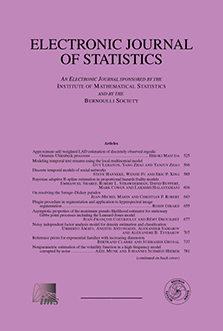Abstract
One main focus of learning theory is to find optimal rates of convergence. In classification, it is possible to obtain optimal fast rates (faster than $n^{-1/2}$) in a minimax sense. Moreover, using an aggregation procedure, the algorithms are adaptive to the parameters of the class of distributions. Here, we investigate this issue in the bipartite ranking framework. We design a ranking rule by aggregating estimators of the regression function. We use exponential weights based on the empirical ranking risk. Under several assumptions on the class of distribution, we show that this procedure is adaptive to the margin parameter and smoothness parameter and achieves the same rates as in the classification framework. Moreover, we state a minimax lower bound that establishes the optimality of the aggregation procedure in a specific case.
Citation
Sylvain Robbiano. "Upper bounds and aggregation in bipartite ranking." Electron. J. Statist. 7 1249 - 1271, 2013. https://doi.org/10.1214/13-EJS805
Information





